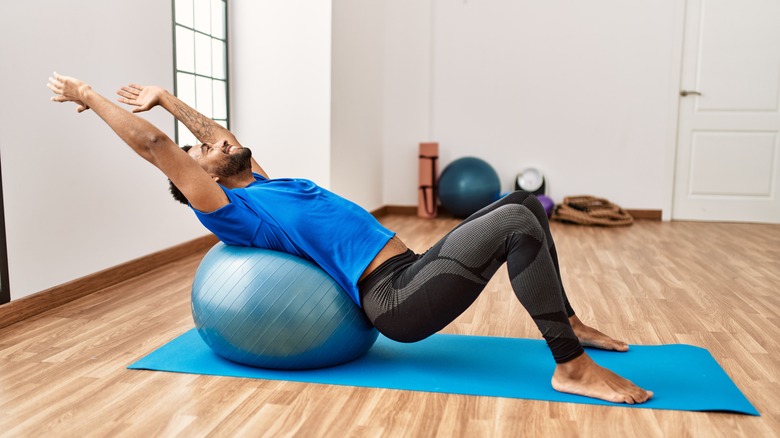How Exercise Can Help You Manage Your IBS Symptoms
Affecting between 25 and 45 million people in the United States alone, irritable bowel syndrome (IBS) is a condition characterized by stomach pain and changes in the bowel that can present as recurrent or chronic diarrhea, constipation, or a combination of the two (per About IBS).
Although there isn't a test that can definitively diagnose IBS, Mayo Clinic explains that IBS treatment focuses on relieving symptoms of the disorder. While more severe cases might require medication, milder cases can often be controlled by managing stress, avoiding triggering foods, eating enough fiber, drinking enough water, getting sufficient sleep, and exercising regularly.
A 2011 study published in The American Journal of Gastroenterology found that regular exercise was linked to a decrease in the severity of IBS symptoms, and conversely, less physical activity was associated with more severe symptoms. Researchers followed up with participants between three to six years later and published another 2015 study in the World Journal of Gastroenterology, which reported that those who maintained regular exercise experienced lasting positive effects in regard to their IBS symptoms. So how exactly does exercise help to manage IBS symptoms? Let's take a closer look.
How exercise can help IBS
Although researchers are still trying to determine exactly why exercise can lessen the severity of IBS symptoms, they believe it could be a result of less stress, better sleep, expelling gas, improved bowel movements, and overall well-being (per Healthline). Stress and poor sleep are massive triggers for IBS, and physical activity can aid in both decreasing stress and promoting better sleep habits. Moving your body more can also help it in its quest to eliminate gas and the resulting discomfort, as well as promote bowel movements. And when we make one healthy life change, others tend to follow suit. A healthy lifestyle is often the best medicine for IBS.
A 2015 study published in the European Journal of Integrative Medicine found that yoga could scientifically improve the symptoms of IBS. If yoga isn't your thing, Healthline suggests other low-impact exercises, like walking, bike riding, swimming, bodyweight exercises, and organized sports, which can also help reduce the severity of IBS.


